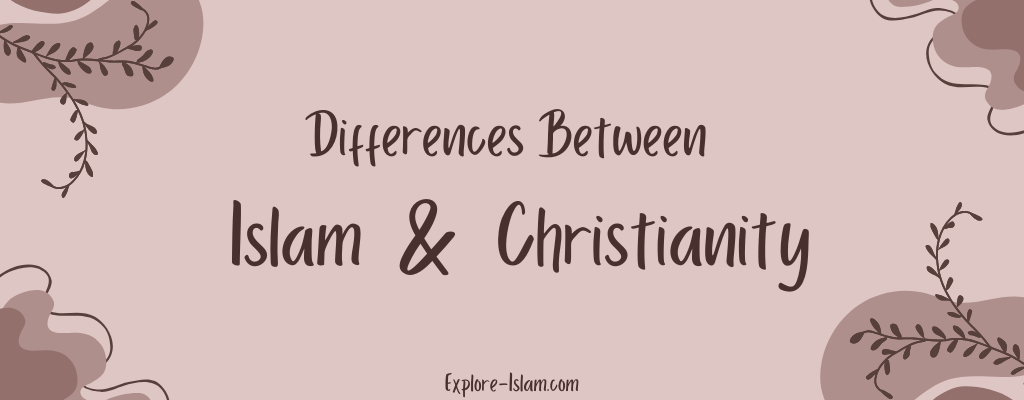The question of Judaism, Christianity, and Islam, similarities and differences, is debated and interesting for truth seekers to follow. These three Abrahamic religions share a common divine origin but also diverge significantly in their beliefs and practices based on their different contexts and scope.
Understanding their similarities and differences is essential for truth seekers to reach the ultimate truth.
This article explores the key commonalities and distinctions between Judaism, Christianity, and Islam, focusing on their concepts of God, prophets, scriptures, and the paths to salvation. The article concludes with the ultimate truth for this subject. Keep reading for deeper insights!
Judaism, Christianity And Islam Similarities And Differences
Judaism, Christianity, and Islam are Abrahamic religions that share a common origin but differ in several key beliefs and practices. These similarities and differences stem from their shared belief in one God and the acknowledgment of prophets like Abraham, Moses, and Jesus (PBUH), yet they diverge significantly on concepts like God’s nature, salvation, and scripture preservation.
Similarities include:
- Belief in one God and many Prophets
- Fasting, charity, and some dietary laws
- Modesty
- Shared prophecies of a final prophet matching Prophet Muhammad (PBUH).
Differences emerge since the Bible was delivered for specific timing to specific people with teachings suitable for this context and then it was altered and abrogated by the universal message of Islam. Here is a selection of the key differences between Islam, Christianity and Judaism:
- Concept of God: God’s nature, with Judaism focusing on God’s human-like traits, Christianity is altered to the Trinity, and Islam emphasizing God’s absolute oneness. Christianity also distinguishes itself by revering Jesus as the Son of God, while Islam views Jesus as a prophet.
- Preservation: Their scriptures also differ in preservation. Islam’s Quran remains unchanged, while the Jewish Torah and Christian Bible have undergone alterations.
- Salvation meaning: Furthermore, the religions differ in their approach to salvation, with Judaism emphasizing repentance, Christianity focusing on Jesus’ atonement, and Islam rejecting original sin, instead emphasizing personal accountability and sincere repentance.
- Scope: Islam also has a universal message meant for all of humanity, while Judaism and Christianity target specific communities and are abrogated by the coming of Islam.
- Growth rate: Finally, growth patterns show Islam as the fastest-growing religion, while Judaism remains exclusive, and Christianity decreases in numbers.
Let’s explore in detail:
Judaism, Christianity, and Islam Similarities
Judaism, Christianity, and Islam share a significant number of similarities due to their common divine origin and belief in the same Creator. These include:
1. Unipersonal Monotheism
All three religions uphold the belief in one true God in their original sense with scattered traces in their current versions. This concept is evident in the sacred texts of each faith:
| Religion | Scripture Quoted | Monotheistic Statement | Current Belief/Practice |
| Islam | Quran 112:1 | “He is Allah—One ˹and Indivisible˺” | Belief in absolute monotheism (Tawhid); God has no partners or equals. |
| Judaism | Isaiah 45:5 | “I am the LORD, and there is no other; besides me, there is no god.” | Strongly monotheistic; belief in one indivisible God. |
| Christianity | Mark 12:29 | “The Lord our God, the Lord is one.” | Originally monotheistic; modern doctrine includes the Trinity, which diverges from oneness. |
2. Belief in Prophets
Judaism, Christianity, and Islam recognize and honor many of the same prophets, including Abraham and Moses (PBUT). Muslims also believe in Jesus (PBUH) as a prophet and the Messiah, whereas Christians view him as the Son of God, and Jews await the Messiah.
3. Fasting
All three religions practice fasting as a spiritual discipline, with some overlapping methods. For instance, Jews observe a fast on Yom Kippur, Christians traditionally fast during Lent, and Muslims fast during Ramadan.
4. Dietary Laws
Certain dietary laws are common across the three faiths, such as prohibitions against consuming pork. Additionally, Muslims and Jews share similar slaughtering rituals (halal and kosher) and dietary ethics rooted in divine guidance. Although the teachings of Jesus confirm the same tradition of forbidding pork, it’s not the common case among Christians.
5. Charity and Almsgiving
Charity is a fundamental obligation in all three faiths:
- In Islam, Zakah is a pillar of faith, alongside voluntary charity (sadaqah).
- In Judaism, Tzedakah is a moral and religious duty.
- In Christianity, giving to the poor is emphasized in the teachings of Jesus.
6. Modest Dressing and Behavior
All three religions promote modesty, especially for women, emphasizing clothing and conduct that reflect spiritual humility.
| Religion | Scripture/Example | Teaching on Modesty |
| Islam | Quran 24:31 | Women are instructed to lower their gaze, guard their chastity, and not reveal their adornments. |
| Judaism | 1 Timothy 2:9 (also part of Christian scripture) | Women should dress modestly, with decency, avoiding elaborate hairstyles, gold, pearls, or expensive clothes. |
| Christianity | 1 Timothy 2:9; Genesis 24:64–65 (example of Mary and women like Rebekah) | Mary and early Christian women wore modest, full-body clothing including head coverings. |
7. Scriptural Prophecies of a Final Prophet
Muslims believe that Prophet Muhammad (PBUH) was foretold in the Torah and the Bible, identifying him as the final messenger of God:
| Source | Reference | Content | Relevance to Prophet Muhammad (PBUH) |
| Quran | Quran 7:157 | “They find him written ˹in the Torah and the Gospel˺.” | Affirms that Prophet Muhammad (PBUH) was foretold in earlier scriptures. |
| Old Testament | Deuteronomy 18:18 | “I will raise up for them a prophet like you from among their brothers.” | Describes a prophet like Moses, interpreted by Muslims as referring to Prophet Muhammad (PBUH). |
| Explanation | — | Prophet Muhammad shares key traits with Moses: natural life, leadership, revelation, and victory. | “Brothers” refers to Ishmaelites, the brothers of Israelites, linking Muhammad to this lineage. |
The prophecy matches Prophet Muhammad (PBUH) as follows:
- Muhammad is like Moses: natural birth, brought new covenants, and led a natural life, had children, and died naturally, defeated their enemies, and led their people.
- Muhammad is among the brothers of Israelites, i.e., the Ishmaelites.
- Almighty God revealed the Quran to Prophet Muhammad (PBUH).
These similarities demonstrate the interconnectedness of these Abrahamic religions, emphasizing their shared values, principles, and origin. Despite being changed, the Bible still contains hints for truth seekers to accept Islam as the final divine message to all humanity.
Judaism, Christianity And Islam Differences
Judaism, Christianity, and Islam are Abrahamic religions that share a common origin but differ significantly in their beliefs, practices, and perspectives out of the human insertions and changes placed in the Bible. Here are the main distinctions among the three:
1. Concept of God
| Faith | Depiction of God | Key Reference | Explanation |
| Judaism | Depicts God with human-like qualities, such as rest after creation. | Genesis 2:2 | Suggests that over time, God’s portrayal in the scriptures became anthropomorphized. |
| Christianity | Believes in the Trinity: Father, Son, and Holy Spirit. | N/A | Diverges from strict monotheism by interpreting God as a triune being. |
| Islam | Upholds God’s absolute oneness and perfection, free from human traits. | Quran 42:11 | Emphasizes God’s uniqueness and transcendence, rejecting human-like qualities or any form of division. |
2. Scripture Preservation
| Faith | View on Scripture Preservation | Key Reference | Explanation |
| Judaism | The Torah shows evidence of human alterations. | Jeremiah 8:8 | Suggests that the Torah has undergone modifications over time, deviating from its original form. |
| Christianity | The Bible’s original content has been lost and distorted. | N/A | The Christian belief holds that the Bible, over time, has experienced changes and loss of original content. |
| Islam | The Quran is divinely preserved, ensuring consistency since its revelation. | Quran 15:9 | Islam teaches that the Quran remains unchanged and preserved in its original form since it was revealed. |
3. View of Prophets
| Faith | View on Prophets | Key Reference | Explanation |
| Judaism | Prophets are depicted with flaws, such as Noah’s drunkenness. | Genesis 9:21 | The Hebrew Bible portrays prophets with human flaws, acknowledging their imperfections. |
| Christianity | Reveres Jesus as the Son of God, while other prophets have negative depictions. | N/A | Christianity holds Jesus as divine, while some other biblical prophets are depicted with flaws. |
| Islam | Prophets are seen as noble role models, with Jesus (Isa) as a revered prophet, not divine. | Quran 3:45 | Islam views prophets as exemplary figures, with Jesus (Isa) being respected but not worshipped as divine. |
4. Salvation
- Judaism: Focuses on repentance and adherence to the law, with practices like Kapparot using a hen as a symbolic transferring of sins.
- Christianity: Teaches salvation through Jesus’s atonement for original sin.
- Islam: Emphasizes personal accountability and sincere repentance, rejecting original sin (Quran 17:15).
5. Universal vs. Exclusive Messages
| Faith | Focus of the Message | Key Reference | Explanation |
| Judaism | Aimed at the Jewish people as the “chosen group”. | Exodus 19:5 | Judaism centers its teachings on the Jewish people as the chosen nation, with a focus on their covenant with God. |
| Christianity | Jesus’ message was initially for the lost sheep of Israel. | Matthew 15:24 | Jesus’ teachings were primarily for the Israelites, with the expectation of another Prophet bringing a universal message. |
| Islam | Islam’s message is universal, for all humanity. | Quran 21:107 | Islam presents itself as the final divine message for all of humanity, emphasizing mercy and guidance for everyone. |
6. Social Laws
- Judaism: Practices like male-dominated inheritance and restrictions during menstruation.
- Christianity: Less focus on detailed social laws, emphasizing spiritual salvation.
- Islam: Provides balanced and practical laws, ensuring justice for men and women (Quran 4:11).
7. Growth of religion
| Religion | Growth and Identity | Key Reference | Explanation |
| Islam | The fastest-growing religion globally. Muslims are projected to make up 30% of the world’s population by 2050. | Pew Research | Islam is growing rapidly, with an expected increase in global population share, driven by high birth rates and conversions. |
| Judaism | Maintains a unique identity, not actively seeking converts except under specific conditions. | Jewish Law | Judaism typically preserves its identity through cultural and religious continuity, focusing on maintaining a closed community. |
| Christianity | The world’s largest religion but will face a slower growth rate compared to Islam, with stable or declining percentages in certain regions. | Pew Research | Christianity remains dominant globally but is projected to grow at a slower pace, with some regions experiencing decline. |
Do you want to know why Islam is the fastest-growing religion? Read these articles:
- The Spread of Islam With Timeline and Map!
- Why is Islam the Fastest-growing Religion?
- 8 Reasons Why You Should Be a Muslim?
By examining these key differences, one can see that Islam provides a more practical, just, and reasonable approach as a divine final law and guidance to humanity.
Conclusion: Islam is the Final And Abrogating Divine Scripture
To conclude, this article delves into the key similarities and differences between Judaism, Christianity, and Islam, highlighting their shared beliefs in monotheism, prophets, and spiritual practices, while also addressing their distinct views on God, scripture, and salvation.
Despite these differences, the article underscores that certain prophecies within the Bible point to the truth of Islam, offering a path for truth seekers to follow the final divine message.
Islam acknowledges Prophet Moses and Jesus and the Bible as central to its faith, yet it teaches that the current versions of the Bible have been altered.
Finally, Islam has the final divine revelation preserved for humanity by a divine promise. That’s why Islam abrogates all previous scriptures and becomes the only accepted divine version for humanity to reach guidance since the coming of Prophet Muhammad PBUH till the end of the world.
Do you want to learn more about Islam and why it’s the only truth preserved for eternal happiness? Start a conversation with our team right now!









